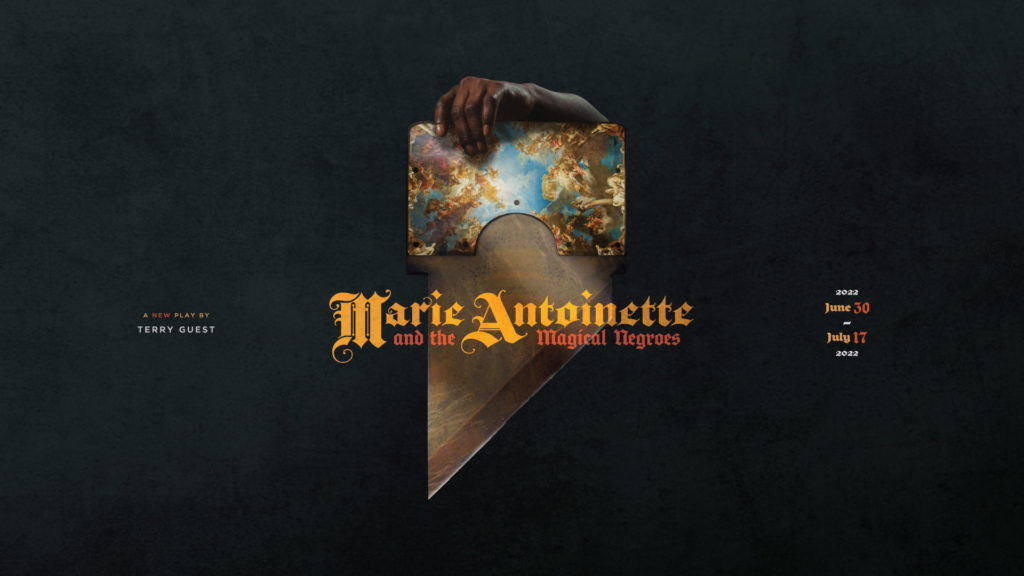
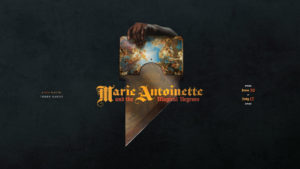 [rating=2]Great acting and impressive choreography cannot save the play “Marie Antoinette and the Magical Negroes”, written and directed by Terry Guest. A reflection on our current times, this story about violence and mob rule is revolting in more ways than one. It depicts tragedy and death at the hands of those who don’t flinch at the uses of savagery. The advance piece states: “This is a play about rage. Revolt. Revolution. Revenge. It is about what happens with Black people grow tired of sitting down and turning the other cheek. What are we left to do? Do we scream? Pray? Should we be peaceful? Should we riot? Can the tools we have used in the past possibly work for the future or do we need to write a new script?” My answer, “Yes, please write a new script. Something more hopeful than what I just saw at the theatre.” I found this performance often too bloodthirsty and irrational to suit my taste. It appeals to the audience’s baser instincts, where violence for the sake of violence might be considered exciting or entertaining. Yet the current script serves as a template for showing us how rage, revenge, and thoughtlessness can take hold on a group of people who have previously been subject to brutality, maltreatment, and hate. But is more hate the answer? When emotions are left raw and fury supplants reason, anarchy and fear can win out. Isn’t it more beneficial to work with others to set common goals and establish common values and deal with each other civilly rather than at the point of a gun? Although I do not prefer a story that focuses on dehumanizing others on stage, this show is nevertheless intriguing. It is lively and creative, and there is never a dull moment in it. Above all, it makes us do a double-take about the forces behind the violent acts we see on the streets of America today.
[rating=2]Great acting and impressive choreography cannot save the play “Marie Antoinette and the Magical Negroes”, written and directed by Terry Guest. A reflection on our current times, this story about violence and mob rule is revolting in more ways than one. It depicts tragedy and death at the hands of those who don’t flinch at the uses of savagery. The advance piece states: “This is a play about rage. Revolt. Revolution. Revenge. It is about what happens with Black people grow tired of sitting down and turning the other cheek. What are we left to do? Do we scream? Pray? Should we be peaceful? Should we riot? Can the tools we have used in the past possibly work for the future or do we need to write a new script?” My answer, “Yes, please write a new script. Something more hopeful than what I just saw at the theatre.” I found this performance often too bloodthirsty and irrational to suit my taste. It appeals to the audience’s baser instincts, where violence for the sake of violence might be considered exciting or entertaining. Yet the current script serves as a template for showing us how rage, revenge, and thoughtlessness can take hold on a group of people who have previously been subject to brutality, maltreatment, and hate. But is more hate the answer? When emotions are left raw and fury supplants reason, anarchy and fear can win out. Isn’t it more beneficial to work with others to set common goals and establish common values and deal with each other civilly rather than at the point of a gun? Although I do not prefer a story that focuses on dehumanizing others on stage, this show is nevertheless intriguing. It is lively and creative, and there is never a dull moment in it. Above all, it makes us do a double-take about the forces behind the violent acts we see on the streets of America today.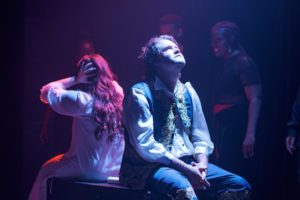
Rooted in late 18th century France and the modern United States, this story examines “bad violence”, such as the assassination of John F. Kennedy, versus “good violence”, as portrayed by the guillotining of Marie Antoinette during the French Revolution. The larger focus has to do with the consequences of power that has rested in an intentionally brutal white elite dating from colonial times. This elite has historically consisted of men who have put black people down, frequently by means of lynchings, torture, and killings. But this show tends to focus more on the white women, with Marie Antoinette being a case in point. When these elite women have not interfered in their father’s, brother’s, or husband’s oppression of others—and instead have concerned themselves with wearing fashionable clothing and accessories—they can be viewed as being complicit. However, one has to remember that many of these women traditionally had little or no power themselves and were victims of the male hierarchy too.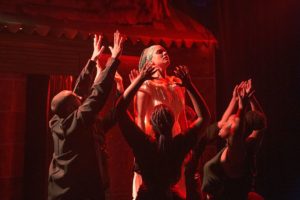
“Marie Antoinette and the Magical Negroes” is meant to be anachronistic and impressionistic. “This is not history” are the words pasted on the wall next to the stage, and this meme is frequently stated by the narrator. The abrupt and constant back-and-forth between 18th century France and the modern United States is meant to point up incongruous elements between the two eras. But unfortunately, this device is not entirely successful in making the playwright’s point about comparative violence. Rather, making a mess out of history only serves to confuse things about how we got into this series of economic, social, and political problems in the first place, thus making it more difficult to solve the disastrous situation in which we currently find ourselves. Yet this show can be considered prophetic—if not just plain accurate—about the frustration and anger that have led some people to commit random street shootings, looting, and wanton destruction in major U.S. cities, especially with the death of George Floyd and the protests during the summer of 2020. (Note that the script was written before these events took place!) For example, one of the characters says how wonderful it feels to kill a police officer. Another character is threatened with a gun and is subsequently shot and killed, because she and the murderer do not share the same ideas about the timing and appropriateness of violence to further one’s cause.
The actors consist of Nathaniel Andrew, Brenna DiStasio, Keith Illidge, Danyelle Monson, Maya Vinice Prentiss, David Stobbe, and Amber Washington. As varied characters played by African Americans pull items out of trunks strewn across the stage, they reveal themselves via less than successful costume changes. (Is this materialization what is meant by the phrase “magical Negroes” in the show’s title?) Note that lighting design by Levi Wilkins and sound design by Andrew Littleton are nicely done. I especially liked the original trap music (a subgenre of hip-hop music), composed by Willow James. Perhaps the best part is the choreography by Ayanna Bria Bakari during the onstage crowd scenes when King Louis XVI and Marie Antoinette are killed. A lot of people in the audience were impressed by the silhouette doll cutouts projected to show the use of the guillotine, but I found this to be highly amateurish and the glorification of cruelty sickening.
Another great feature is the emphasis on the messages by Kennedy, Martin Luther King, Rodney King, and Ida B. Wells. We see how their statements have become empty words in the face of an increasingly hostile reality. How can anybody take them and their vision seriously? But the problem with this play is that there are a whole host of mixed messages, including cocaine use and undue swearing combined with too many sarcastic and mildly comedic exchanges; all of which minimize the larger truths that these legends once spoke of. We also see that murder and mayhem as revenge for past wrongs may not bring freedom but can potentially lead to a new form of domination by vile sorts who want to wrest political power and control for themselves. But since the script has made a mockery of what freedom might mean (as in being free to kill without impunity), we start to wonder if a brighter future for all of us is indeed possible. When unthinking and unfeeling impulses are stoked to take the place of rational thought and problem-solving, this can lead depraved individuals to commit acts of violence just because they can—or just because they feel they can get away with it. So the question becomes: “How do you break this vicious cycle?”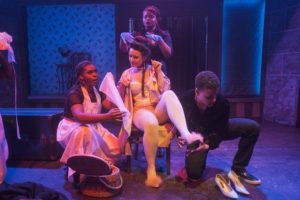
The Story Theatre’s production of “Marie Antoinette and the Magical Negroes” is playing through July 17, 2022, at the Raven Theatre, 6157 N. Clark Street (at Granville), in Chicago.
Tickets: $20
Students/active military, and veterans: $10
Special group rates are available. Call 773-338-2177 or email paulmichael@thestorytheatre.org for more information.
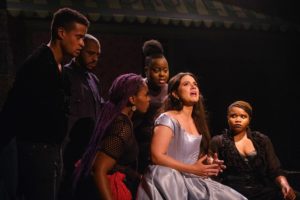 Performance schedule:
Performance schedule:
Thursdays, Fridays, and Saturdays – 7:30 p.m.
Sundays – 3:00 p.m.
To purchase tickets, go to https://thestorytheatre.org/ or call 773-338-2177.
The Raven Theatre follows all COVID safety protocols. The Story Theatre and the Raven currently require proof of vaccination and masking at all performances. This is subject to change. For current information on COVID requirements, visit raventheatre.com/covid-19.
Note: I am writing this just after the events at the Highland Park Fourth of July parade. On a day when we were supposed to celebrate freedom, our lives were marred by tragedy. My thoughts and prayers are with the victims and their families, friends, and neighbors. Thus my review of this show is likely influenced by the senselessness of that violence in addition to all the other dreadful shootings that have taken place on a daily basis in so many communities.
To see what others are saying, visit www.theatreinchicago.com, go to Review Round-Up and click at ” Marie Antoinette and the Magical Negroes”.


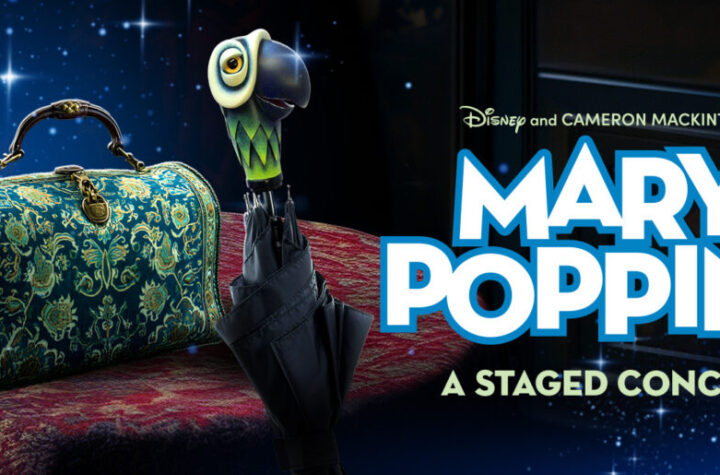
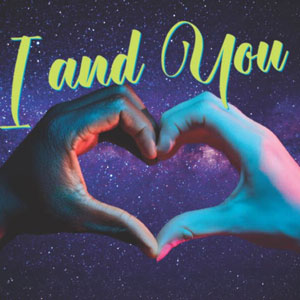
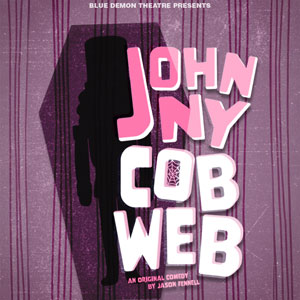
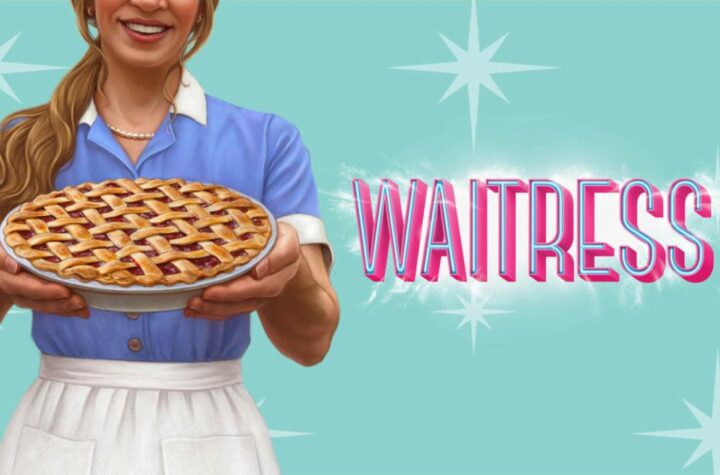
More Stories
“Mary Poppins : A Staged Concert” reviewed by Julia W. Rath
” I and You”
“Johnny Cobweb” reviewed by Mark Reinecke